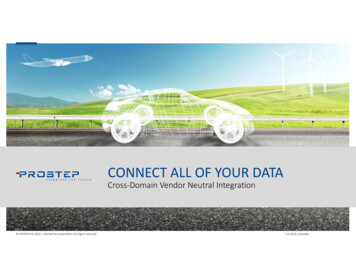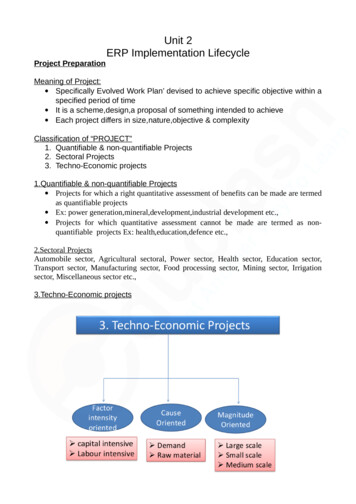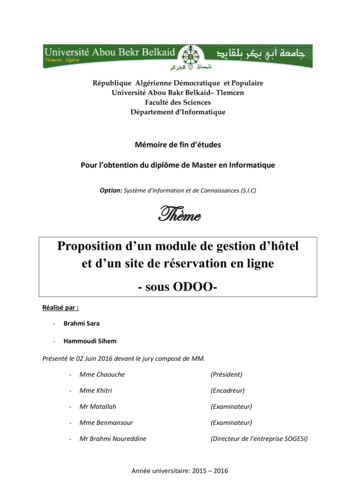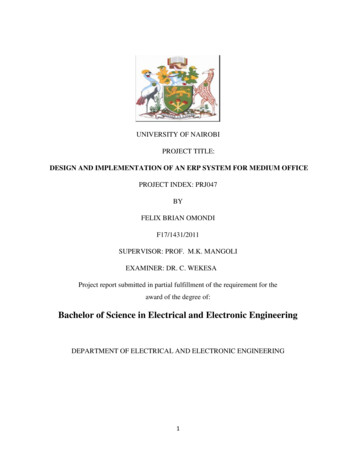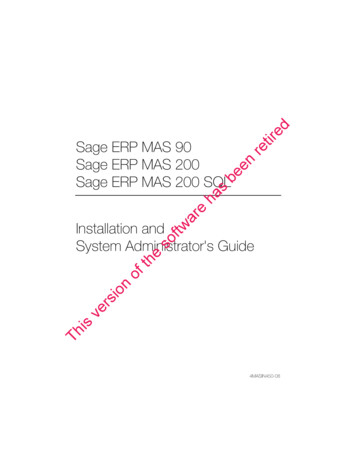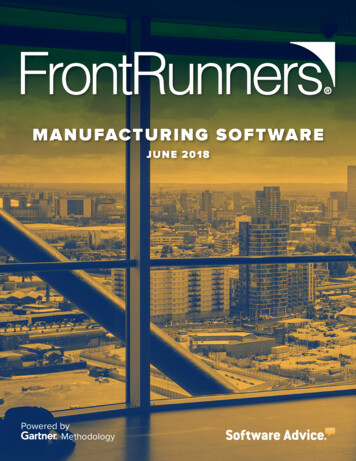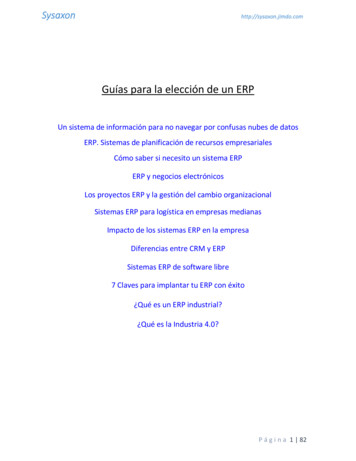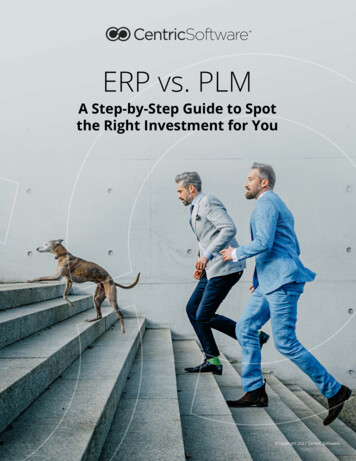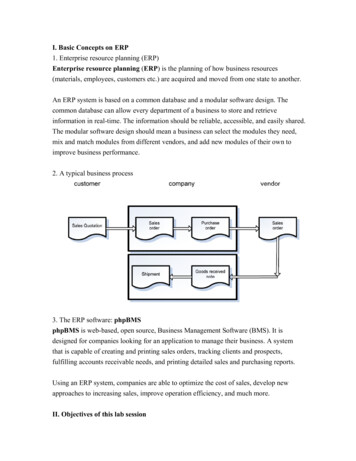
Transcription
ERP vs. Bestof-Breed WMSPresented by:Sponsored by:Chuck FuerstDirector of Product Strategy 2014 MHI Copyright claimed as to audiovisual works of seminar sessions andsound recordings of seminar sessions. All rights reserved.
Introduction 17 years experience in technology and enterprise software marketsHighJump customers include high tech, manufacturing, retail,apparel, 3PL, and consumer products companiesClosely monitor WMS industry trendsLead product strategy for tier 1 WMS / supply chain executionsoftware provider
ERP vs. Best-of-Breed WMS:Which is best for you? Companies face the ongoing challenge to justify investment in bestof-breed solutions vs. off-the-shelf functionality The ERP/WMS decision is not as simple as what makes the mostsense for your budget Two considerations are key:– Clearly and completely defining your long-term businessobjectives and functional requirements– Balance the objectives against implementation and integrationcosts
Best-of-Breed Best-of-Breed: A best-of-breed (or best in class) product has beenidentified as the best product of its type.Enterprises often purchase software from different vendors to obtainthe best-of-breed offering for each application area.-Gartner IT Glossary
Don’t assume Many companies falsely assume that implementing an existingwarehousing module from their ERP is inexpensiveHaving the right warehouse management system in place can havefar-reaching implications for a company, and can enable you to runa run a logistics operation that is leaner, efficient and more reliable
Your ERP already offers you WMSfunctionality Although still playing catch up, major EPR vendors have made gainsin closing the functionality gap vs. best of breed vendorsA company will typically go with its ERP’s WMS module:– The ERP vendor has oversold its WMS capabilities– Willing to sacrifice functionality for the ease of integration– The ERP vendor will often include the WMS module at little or noupfront costWhile integration and a single-vendor solution are indeed importantevaluation considerations, do not overemphasize them against otherequally important criteria when evaluating both ERP/WMS and bestin-class solutions
What’s the best way to answer the ERP vs.WMS question? Evaluate the following:––––––––Business strategyThe cost factor and TCO ( total cost of ownership)Functionality fitVendor’s core focusCultureInfrastructure and architectureProduct maturityImplementation
Business Strategy It is imperative to understand the business strategy, tactics,operational requirements and goals the system is intended tosupportWhat are the long term objectives for your DCs and distribution– Will there be a need to integrate automation systems? Success needs to be measured by the ability of the chosen solutionto enhance business value
The Cost Factor Even if the ERP warehouse module is “free,” the ROI may not beequivalent to a best-of-breed WMS because the ERP lacks keyfunctionality– TCBO (total cost of business opportunity) versus TCO (total costof ownership)
Functionality Fit Functionality is a key component of a successful implementation– How quickly and cost-effectively can the solution adapt to your changingrequirements?– If excessive workarounds are required to make the functionality fit yourrequirements, how can labor utilization KPIs be met? Major WMS-ERP difference: How each models the processes beingexecuted in the real world within their applications.– ERPs are great for the world of purchasing and sales, but WMS systems live inthe physical world of receiving, storing, and shipping goods For simple warehouses, such as full pallet in, full pallet out, the ERPWMS might be sufficient
Consider these reality checks What is the cost of workarounds to compensate for missingfunctionality?What is the potential impact on customer satisfaction?How well does your ERP provider know the supply chain industry?
Core Focus of the Vendor Vendor domain expertise must be a key evaluation criterion whenconsidering WMS alternativesPay particular attention to rating product innovation and vendorservices against both current offerings and capabilitiesConsider:– Membership/active participation in professional organizations– Dedication to industry vertical and a “horizontal” discipline.– Investment in R&D and support programs ERP WMS must compete for resources and funds with all otherapplication areasBest of breed WMS vendors have the advantage of a singular focus
Culture The vendor is a partner – don’t overlook the importance of a culturefitEffective dialogueCollaborationReference checks
Architecture The ability of your internal resources may dictate whether a best-ofbreed or an ERP is manageableSolution’s ability to interface with other applications and devicesSingle, monolithic infrastructure vs. portfolio of solutionsWith long life cycles, vendor and product viability should beconcernsDo not overlook the importance of issues such as productadaptability, vendor innovation, bolt-on components, andvendor/product responsiveness to emerging business trends
Product Maturity Should be “battle tested” by end-users– Multiple ways to solve a functional requirement rather than justoneThe importance of visibilityThe vendor must take the application beyond the four walls of thewarehouseThe limitations of an ERP in complex operations may make it morecostly than you expect not “free” after allWMS life cycles can run 7-10 years, so consider not only initialvalue-add (i.e., short-term business benefit, ROI), but also the valueadd over the life of the relationship
Implementation Vendor must have support staff available to you– Consider the skill and experience levels of people, their breadth of WMSknowledge, and the vendor’s service capacity Generic implementation vs. a high-value one based on productknowledge and industry expertiseWill system customizations and workarounds with either solutionimpact your ability to upgrade in the future to take advantage of newinnovation?– If you have an upgrade path, what is the cost to carry forward thosecustomizations?
No such thing as “free” Even if the ERP warehouse module is “free,” the ROI may not beequivalent to a best-of-breed WMS– The complexity of the implementation, and skills and timerequired to execute it– The functional fit of the solution– Its ability to meet functional requirements without added timeand cost to modify the product and the training fees– What happens when you switch ERPs? Sometimes you outgrow your ERP or become dissatisfied with a particularERP vendor. A good WMS must integrate with all major ERP platforms.
Additional Considerations Are business requirements driving the need for advanced softwarefunctionality?– Do these capabilities drive strategic value for your business? How complex is your current system landscape?– Does a best of breed system simplify things? How effective are your vendor management capabilities?– Are you equipped to managed multiple vendor relationships?– Or is one or few vendors best?
Final Thought Companies invest in WMS systems toreduce costs, increase efficiencies, andimprove customer service Select the system that is going to bestmeet these objectives for your company
For More comVisit MODEX 2014 Booth 4310
Your ERP already offers you WMS functionality Although still playing catch up, major EPR vendors have made gains in closing the functionality gap vs. best of breed vendors A company will typically go with its ERP's WMS module: -The ERP vendor has oversold its WMS capabilities


